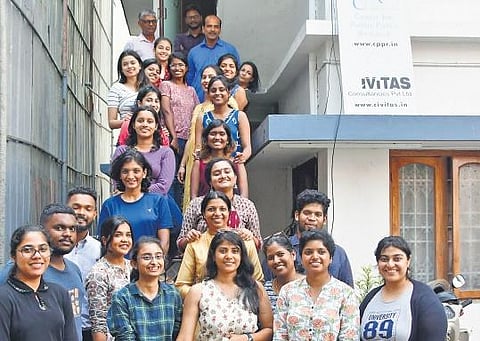

KOCHI: At a time when independent think tanks were a rarity in Kerala, the Centre for Public Policy Research (CPPR) initially emerged as a blip of intellectual acuity. Today, as it enters its 20th year, the Kochi- based centre stands tall on the transformative research landscape.
Founded in 2004 by a dynamic group of eight friends, each hailing from diverse academic disciplines, CPPR’s inception was rooted in the brainwave of its current chairman D Dhanuraj. He conceived the idea of starting a research centre while doing his MA in political science at Madras Christian College.
“We have been working on various tangents such as mobility, governance, livelihood, housing, and finance,” says Dhanuraj. “We focus more on urban issues because the future of the country depends on urbanisation. And it is not just about building flyovers or introducing other modern infrastructure.”
Over the years, CPPR has traversed an expansive journey, diversifying its expertise across ten vital sectors: urban governance, economy and public finance, urban transport, governance and law, educational policies, international relations, health policies, security and defence, elections, and technology and artificial intelligence.
While CPPR’s nascent phase was not without its hurdles, its affiliation with select institutes came as a shot in the arm and provided a platform to produce policy-related papers and secure critical funding.
A seminal turning point was the Jawaharlal Nehru National Urban Renewal Mission’s (JNNURM) launch in 2009. “We got out our first national project.
Engaging in executing street vending policies across 63 cities, CPPR’s expertise garnered much-deserved recognition and visibility,” Dhanuraj recalls. “Street vending is one project we are still working on. As a pilot project, we took the research to Alappuzha, identified vending zones in compliance with the law, and the report has now been passed by the municipal council.”
CPPR’s transformative impact extends beyond research and analysis, with tangible contributions to the development of a mobility hub at Vytilla, comprehensive analysis of smart inland waterway development, city bus networks, and metro rail effectiveness, and proactive reforms in the Model Shops and Commercial Establishments Act 2016.
“Based on our suggestions, now shops can be kept open round the clock, women staff can work during night hours, and a shift system was also brought into place,” Dhanuraj notes. When asked what change CPPR would like to foster in Kerala, Dhanuraj flags the higher education system. “Why are our students going abroad for higher education?” he asks.
“One of the key reasons is the dearth of new courses and quality teachers. Also, I believe the current education system has to be challenged by introducing private universities to Kerala, and they should be granted autonomy.”
Notably, 19 years since it was born on July 9, 2004, CPPR today brims with a team of 35 dedicated researchers and also has a thriving academy that provides training and research opportunities to young minds.